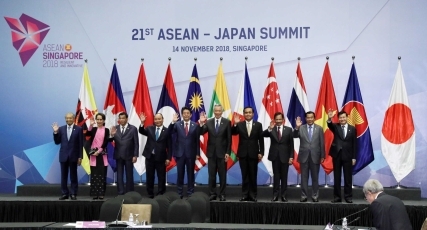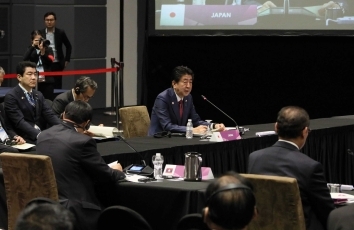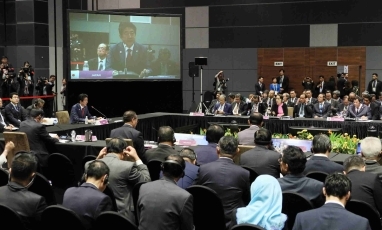Japan-ASEAN Relations
21st Japan-ASEAN Summit Meeting
 Photograph of the Prime Minister attending a photograph session
Photograph of the Prime Minister attending a photograph session at the Japan-ASEAN Summit Meeting
(Photo: Cabinet Public Relations Office)
 Photograph of the Prime Minister making a statement
Photograph of the Prime Minister making a statement at the Japan-ASEAN Summit Meeting
(Photo: Cabinet Public Relations Office)
 Photograph of the Prime Minister making a statement
Photograph of the Prime Minister making a statement at the Japan-ASEAN Summit Meeting
(Photo: Cabinet Public Relations Office)
On Wednesday, November 14, from 3:55 p.m. (local time), for about 1 hour, the Japan-ASEAN Summit Meeting was held in the Republic of Singapore chaired by H.E. Mr. Lee Hsien Loong, Prime Minister of Singapore. Mr. Shinzo Abe, Prime Minister, attended from Japan. The overview of the meeting is as follows.
- Chairman's Statement of the 21st ASEAN-Japan Summit (English (PDF)
 )
)
1. Opening remarks
Following the statement by Prime Minister Lee, Prime Minister Abe stated the following.
(1) 45th anniversary of ASEAN-Japan Friendship and Cooperation
This year marks the 45th anniversary of ASEAN-Japan Friendship and Cooperation and we welcome the issuance of the Joint Statement of the 21st ASEAN-Japan Summit to Commemorate the 45th Anniversary of ASEAN-Japan Friendship and Cooperation. Following the ASEAN-Japan Music Festival held in Tokyo last month, the ASEAN-Japan Day will be held in Viet Nam next year. We will work to ensure that this is an opportunity to further deepen mutual understanding between Japan and ASEAN Member States.
(2) Assistance to ASEAN
Japan’s assistance to ASEAN has exceeded its commitment to provide 2 trillion yen over five years. We will support private investment and advance the development of quality infrastructure in accordance with international standards while respecting ASEAN’s unity and centrality. Specifically, Japan will utilize a new financing facility of the Japan Bank for International Cooperation (JBIC) and support for a variety of infrastructure projects that contribute to global environmental preservation.
(3) Industrial Human Resource Development Cooperation Initiative 2.0
Looking to the next five years, Japan will newly support industrial human resource development of approx. 80,000 people, including the digital sector such as artificial intelligence (AI), as “the Industrial Human Resource Development Cooperation Initiative 2.0.”
(4) ASEAN-Japan Fourth Industrial Revolution Initiative
Under the ASEAN-Japan Fourth Industrial Revolution Initiative, Japan will implement measures which include introducing digital-related rules and providing human resource development assistance.
(5) Promotion of free trade
As a standard-bearer of free trade, Japan will promote free and fair rules throughout the world through World Trade Organization (WTO) reform and other measures. From this perspective, the TPP-11 Agreement entering into force by the end of the year is an important achievement. Japan will aim to expand TPP-11, achieve swift conclusion of the Regional Comprehensive Economic Partnership (RCEP) negotiations, and realize the early signing of the Protocol to Amend the ASEAN-Japan Comprehensive Economic Partnership (AJCEP) Agreement.
(6) Smart Cities Network
Japan and Singapore will co-host the ASEAN Smart Cities Network (ASCN) Tokyo High-level Meeting next year. Japan will cooperate with ASEAN to realize ASCN by partnering with Society 5.0, the ASEAN-Japan Innovation Network, and the Japan-ASEAN STI for SDGs Bridging Initiative among others.
(7) Disaster management cooperation
Japan will utilize the Japan-ASEAN Integration Fund (JAIF) and collaborate with ASEAN in the area of disaster management, including cooperation through the ASEAN Coordinating Centre for Humanitarian Assistance on Disaster Management (AHA Centre).
(8) Environment cooperation
Japan will expand cooperation with ASEAN in combating marine plastic debris, in addition to addressing climate change based on the Japan-ASEAN Environment Cooperation Initiative.<./p>
(9) Asia Health and Wellbeing Initiative
Japan will work to bring about a balanced healthcare system under the Asia Health and Wellbeing Initiative.
(10) Education and culture
Japan will continue to deepen exchanges in the areas of education, science and technology, culture, and sports through the “WA Project” and other initiatives, building momentum towards the Olympic and Paralympic Games Tokyo 2020.
(11) ASEAN-Japan Centre
Japan will continue to advance necessary reforms of the ASEAN-Japan Centre.
2. Closed session
Prime Minister Abe stated the following on defense cooperation and regional and international affairs.
(1) Defense cooperation
Japan will promote practical defense cooperation under the Vientiane Vision.
Following the establishment of the ASEAN-Japan Cybersecurity Capacity Building Centre (AJCCBC) in Bangkok in September this year, Japan will continue to collaborate with ASEAN in the area of cybersecurity.
(2) Regional and international affairs
i. Free and open Indo-Pacific
Japan will continue to work closely with ASEAN member states to maintain and strengthen a free and open Indo-Pacific.
ii. North Korea
It is necessary to fully implement United Nations Security Council (UNSC) resolutions in order to achieve complete, verifiable and irreversible dismantlement (CVID) of all weapons of mass destruction and ballistic missiles of all ranges by North Korea as stipulated in UNSC resolutions.
Japan will wish to cooperate for responding to ship-to-ship transfers prohibited by the UNSC resolutions. Japan hopes to have ASEAN’s understanding and cooperation towards the early resolution of the abductions issue.
iii. South China Sea
Japan and ASEAN have enjoyed peace and prosperity through trade in the South China Sea. The South China Sea is a lifeline for both sides and freedom of navigation in the South China Sea is vital.
Japan fully supports the fundamental principles that ASEAN has upheld to ensure freedom of navigation and expresses its appreciation for ASEAN’s efforts, including those on the Code of Conduct (COC) negotiations. Japan hopes that these principles will be reflected in the COC.
Japan shares deep concerns over unilateral attempts to change the status quo in the South China Sea with ASEAN.
Japan will support ASEAN’s initiatives that seek to uphold non-militarization of the area and maintain a peaceful and open South China Sea.
In response, ASEAN made congratulatory remarks regarding the 45th anniversary of ASEAN-Japan Friendship and Cooperation. In addition, many countries commended Japan’s cooperation in various areas including disaster management and strengthening connectivity, and expressed appreciation for Japan’s efforts to realize a free and open Indo-Pacific. Issues on North Korea and the South China Sea were also raised.
Finally, as the Chair of ASEAN and with the approval of all participating countries, Singapore declared the issuance of the Joint Statement of the 21st ASEAN-Japan Summit to Commemorate the 45th Anniversary of ASEAN-Japan Friendship and Cooperation and concluded the meeting.

